八上英语单元知识点总结
复习人教版八年级英语上册各单元必背知识点整理(打印版)
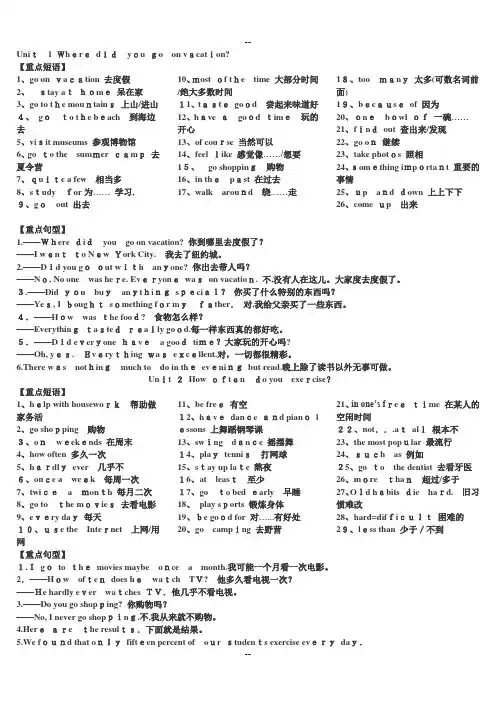
Unit 1 Wheredidyou go on vacation? 【重点短语】1、go on vacation 去度假2、stay athome呆在家3、go to the mountains上山/进山4、goto the beach到海边去5、visit museums 参观博物馆6、go to the summer camp去夏令营7、quite a few相当多8、studyfor为…… 学习,9、goout 出去10、most of the time 大部分时间/绝大多数时间11、tastegood尝起来味道好12、have agood time玩的开心13、of course 当然可以14、feel like 感觉像……/想要15、go shopping购物16、in thepast 在过去17、walk around绕……走18、toomany太多(可数名词前面)19、becauseof 因为20、onebowl of一碗……21、findout 查出来/发现22、go on继续23、take photos 照相24、something important 重要的事情25、up and down 上上下下26、come up出来【重点句型】1.——Where didyou go on vacation? 你到哪里去度假了?——I wentto New York City.我去了纽约城。
2.——Did you goout with anyone? 你出去带人吗?——No, No one was here. Everyonewason vacation. 不,没有人在这儿。
大家度去度假了。
3.——Did you buyanythingspecial?你买了什么特别的东西吗?——Yes, I boughtsomething for myfather.对,我给父亲买了一些东西。
4.——How was the food?食物怎么样?——Everythingtastedreally good.每一样东西真的都好吃。
(完整版)八年级上册英语各单元知识点
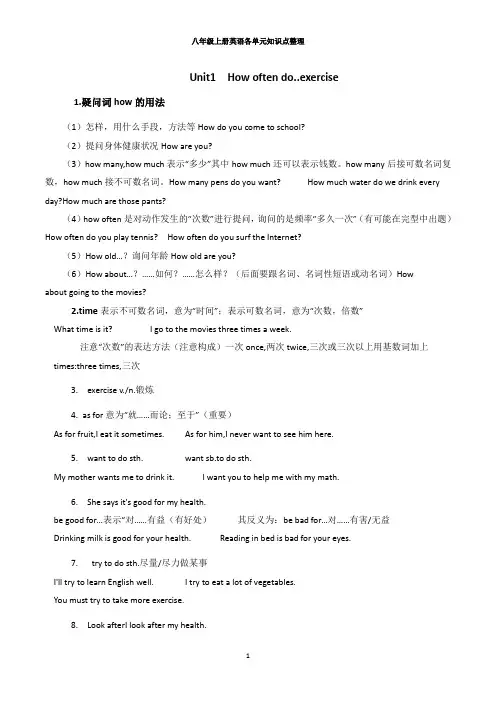
Unit1 How often do..exercise1.疑问词how的用法(1)怎样,用什么手段,方法等How do you come to school?(2)提问身体健康状况How are you?(3)how many,how much表示“多少”其中how much还可以表示钱数。
how many后接可数名词复数,how much接不可数名词。
How many pens do you want? How much water do we drink every day? H ow much are those pants?(4)how often是对动作发生的“次数”进行提问,询问的是频率“多久一次”(有可能在完型中出题)How often do you play tennis? How often do you surf the Internet?(5)How old…?询问年龄How old are you?(6)How about…?……如何?……怎么样?(后面要跟名词、名词性短语或动名词)Howabout going to the movies?2.time表示不可数名词,意为“时间”;表示可数名词,意为“次数,倍数”What time is it? I go to the movies three times a week.注意“次数”的表达方法(注意构成)一次once,两次twice,三次或三次以上用基数词加上times:three times,三次3. exercise v./n.锻炼4. as for意为“就……而论;至于”(重要)As for fruit,I eat it sometimes. As for him,I never want to see him here.5. want to do sth. want sb.to do sth.My mother wants me to drink it. I want you to help me with my math.6. She says it's good for my health.be good for…表示“对……有益(有好处)其反义为:be bad for…对……有害/无益Drinking milk is good for your health. Reading in bed is bad for your eyes.7. try to do sth.尽量/尽力做某事I'll try to learn English well. I try to eat a lot of vegetables.You must try to take more exercise.8. Look afterI look after my health.My brother is ill. I have to look after him today.He often helps his mother look after his little sister.9. help sb.(to)do sth.帮助某人做某事(to大多都是省略)My healthy lifestyle helps me get good grades. She often helps me learn math.10. the same as…与……一样Is her lifestyle the same as yours or different?She looks the same as her sister.11. I think I'm kind of unhealthy.kind of=a little有点儿(重要短语);a kind of一种12. although=thoughAlthough he's ill,he goes to school on time.13. keep in good health(重点掌握)=keep healthy=stay healthykeep+形容词表示保持某种状态A lot of vegetables help you to keep in good health.Keep quiet!The baby is sleeping. We must keep our classroom clean14. That sounds interesting.look(看起来),sound(听起来),smell(闻起来),taste(尝起来),feel(觉得),seem(好象),grow(变得),get(变得)等词在英语中可用作系动词,后跟形容词作表语。
(完整版)八年级上册第一单元英语语法、短语和知识点总结
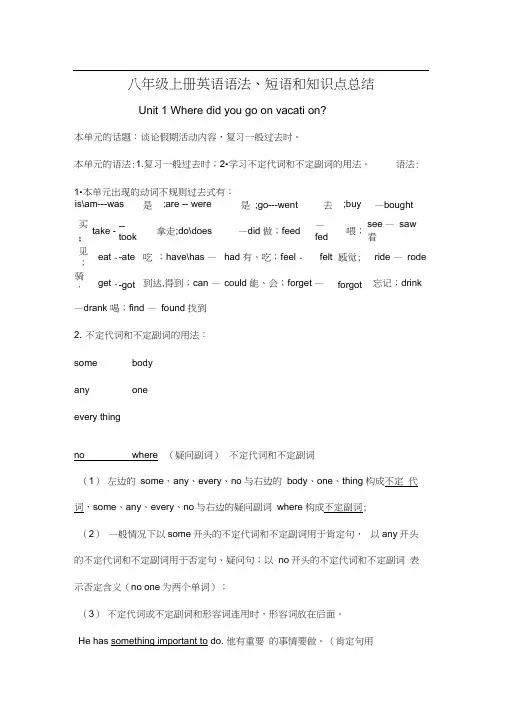
八年级上册英语语法、短语和知识点总结Unit 1 Where did you go on vacati on?本单元的话题:谈论假期活动内容,复习一般过去时。
本单元的语法:1.复习一般过去时;2•学习不定代词和不定副词的用法。
语法: 1•本单元出现的动词不规则过去式有:is\am---was 是;are -- were 是;go---went 去;buy —bought买;take ---took拿走;do\does —did 做;feed—fed喂;see —saw看见;eat --ate 吃;have\has —had 有、吃;feel -felt 感觉;ride —rode 骑;get --got 到达,得到;can — could 能、会;forget —forgot 忘记;drink —drank 喝;find —found 找到2. 不定代词和不定副词的用法:some bodyany oneevery thingno where (疑问副词)不定代词和不定副词(1)左边的some、any、every、no 与右边的body、one、thing 构成不定代词,some、any、every、no与右边的疑问副词where 构成不定副词;(2)—般情况下以some开头的不定代词和不定副词用于肯定句,以any开头的不定代词和不定副词用于否定句、疑问句;以no开头的不定代词和不定副词表示否定含义(no one为两个单词);(3)不定代词或不定副词和形容词连用时,形容词放在后面。
He has something important to do. 他有重要的事情要做。
(肯定句用something,形容词important 放后)Did you buy anything special?(一般疑问句用anything,形容词special放后)Did you go any where interesting last mon th? 上个月你去令人感兴趣的地方了吗?(一般疑问句用不定副词anywhere,形容词interesting 放后)(4)不定代词和不定副词做主语时,后面的动词用单数形式。
八年级英语上册第一单元知识点总结
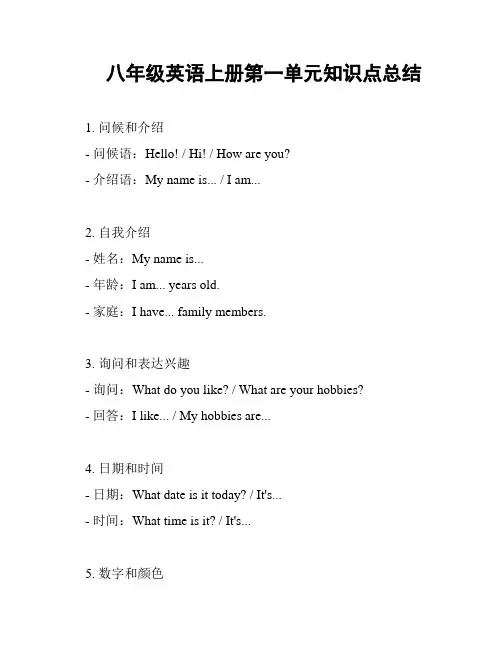
八年级英语上册第一单元知识点总结1. 问候和介绍- 问候语:Hello! / Hi! / How are you?- 介绍语:My name is... / I am...2. 自我介绍- 姓名:My name is...- 年龄:I am... years old.- 家庭:I have... family members.3. 询问和表达兴趣- 询问:What do you like? / What are your hobbies?- 回答:I like... / My hobbies are...4. 日期和时间- 日期:What date is it today? / It's...- 时间:What time is it? / It's...5. 数字和颜色- 数字:Counting from 1 to 10.- 颜色:Red, yellow, blue, green, etc.6. 学校生活- 学科:Subjects like math, English, science, etc.- 教室:Classroom, blackboard, desk, etc.- 研究活动:Study, read, write, listen, speak, etc.7. 家庭成员- 家人:Father, mother, brother, sister, etc.- 关系:My father is... / My mother is...8. 日常活动- 问答:What do you do in the morning/afternoon/evening? - 回答:I... / I usually...9. 问路和指示- 问路:Excuse me, where is the...?- 指示:Go straight, turn left/right, etc.10. 国家和语言- 国家:China, America, England, etc.- 语言:Chinese, English, French, etc.以上是八年级英语上册第一单元的基本知识点总结。
人教版八年级英语上册各单元知识点汇总
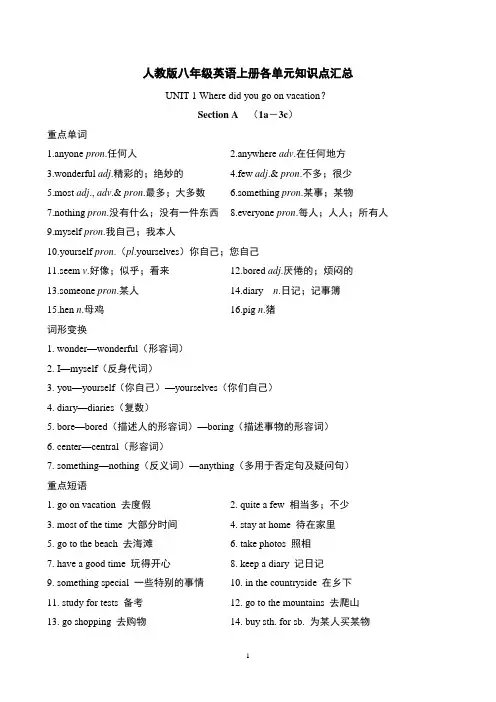
人教版八年级英语上册各单元知识点汇总UNIT 1 Where did you go on vacation?Section A(1a-3c)重点单词1.anyone pron.任何人2.anywhere adv.在任何地方3.wonderful adj.精彩的;绝妙的4.few adj.& pron.不多;很少5.most adj., adv.& pron.最多;大多数6.something pron.某事;某物7.nothing pron.没有什么;没有一件东西8.everyone pron.每人;人人;所有人9.myself pron.我自己;我本人10.yourself pron.(pl.yourselves)你自己;您自己11.seem v.好像;似乎;看来12.bored adj.厌倦的;烦闷的13.someone pron.某人14.diary n.日记;记事簿15.hen n.母鸡16.pig n.猪词形变换1. wonder—wonderful(形容词)2. I—myself(反身代词)3. you—yourself(你自己)—yourselves(你们自己)4. diary—diaries(复数)5. bore—bored(描述人的形容词)—boring(描述事物的形容词)6. center—central(形容词)7. something—nothing(反义词)—anything(多用于否定句及疑问句)重点短语1. go on vacation 去度假2. quite a few 相当多;不少3. most of the time 大部分时间4. stay at home 待在家里5. go to the beach 去海滩6. take photos 照相7. have a good time 玩得开心8. keep a diary 记日记9. something special 一些特别的事情10. in the countryside 在乡下11. study for tests 备考12. go to the mountains 去爬山13. go shopping 去购物14. buy sth. for sb. 为某人买某物15. taste good/great 尝起来很好16. visit sb. /sp. 拜访某人/参观某地17. go out 出去18. go to summer camp 去夏令营19. of course 当然重点句型1. Long time no see.好久不见。
人教版八年级英语上册单元知识点归纳
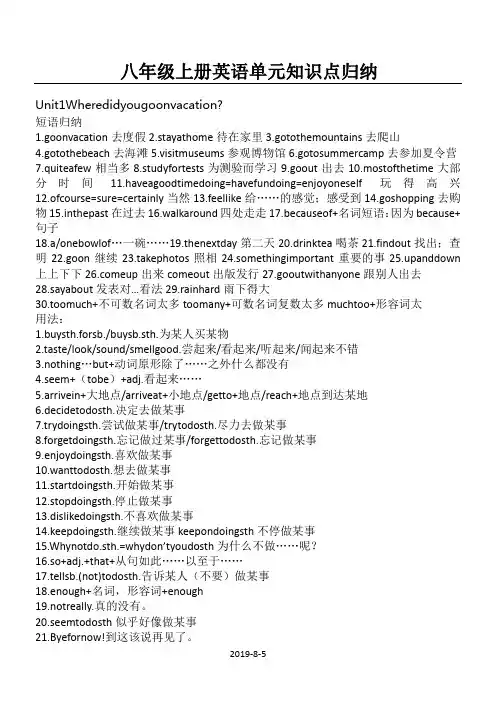
八年级上册英语单元知识点归纳Unit1Wheredidyougoonvacation?短语归纳1.goonvacation去度假2.stayathome待在家里3.gotothemountains去爬山4.gotothebeach去海滩5.visitmuseums参观博物馆6.gotosummercamp去参加夏令营7.quiteafew相当多8.studyfortests为测验而学习9.goout出去10.mostofthetime大部分时间11.haveagoodtimedoing=havefundoing=enjoyoneself玩得高兴去购物because+句子明用法:3.nothing4.seem+13.dislikedoingsth.不喜欢做某事14.keepdoingsth.继续做某事keepondoingsth不停做某事15.Whynotdo.sth.=whydon’tyoudosth为什么不做……呢?16.so+adj.+that+从句如此……以至于……17.tellsb.(not)todosth.告诉某人(不要)做某事18.enough+名词,形容词+enough19.notreally.真的没有。
20.seemtodosth似乎好像做某事21.Byefornow!到这该说再见了。
22.Howdoyoulike…=Whatdoyouthinkof…=Whatdoyouthinkabout…Unit2Howoftendoyouexercise?短语1.helpwithhousework帮助做家务2.onweekends=ontheweekend在周末3.howoften多久一次howsoon多久(回答in10years)4.hardlyever几乎从不5.onceaweek每周一次twiceamonth每月两次everyday每天three/four…timesaweek每周三四…次6.befree=beavailable有空7.gotothemovies去看电影etheInternet用互联网ontheInternet在网上surftheInternet 上网9.swingdance摇摆舞10.playtennis打网球play+球类/棋类/中国乐器playthe+西洋乐器11.stayuplate熬夜;睡得很晚12.atleast至少atmost最多擅长根本firstofall用法少…?5.主语7.It’10.WhatUnit3I短语3.thesingingcompetition唱歌比赛4.besimilarto与……相像的/类似的thesame…as和……相同;与……一致bedifferentfrom与……不同5.careabout关心;介意takecareof=lookafter照顾6.belikeamirror像一面镜子7.themostimportant最重要的8.aslongas只要;既然9.bringout使显现;使表现出10.getbettergrades取得更好的成绩11.reachfor伸手取12.infact 事实上;实际上13.makefriends交朋友14.one…,theother…一个…,另一个15.touchone’sheart 感动某人16.betalentedinmusic有音乐天赋17.shareeverything分享一切18.talkabout谈论19.primaryschoolstudents小学生middleschoolstudent中学生rmation是不可数名词,一则消息:apieceofinformation 21.theEnglishstudycenter英语学习中心用法1.makesb.dosth.让某人做某事2.wanttodosth.想要做某事3.That’snotimportantforme…对我来说,那是不重要的4.both放于be动词之后5.callsbat+电话号码:给某人打电话6.主语+谓语+比较级+than+比较对象形容词和副词的比较级、最高级大多数形容词和副词有三个等级:1)原级(不作比较),修饰词very,so,too,pretty,really;2)比较级,表示“较……”或“更……”的意思(两者之间进Unit4What’sthebestmovietheater?1.movietheater电影院2.closeto…离……近3.clothesstore服装店4.intown在镇上benewintown新来到镇上的5.sofar到目前为止6.10minutesbybus坐公共汽车10分钟的路程7.talentshow才艺表演8.have…incommon有相同特征的incommon共同,共有9.aroundtheworld世界各地;全世界10.moreandmore……越来越……11.andsoon等等给买票快用法:4.oneof+5.can’1.thinkof谈话节目gameshow游戏节目soapopera肥皂剧sportsshow体育节目scarymovies恐怖电影5.watchamovie看电影6.apairof一双;一对7.tryone’sbesttodosth尽某人最大努力做某事8.haveadiscussionabout就……讨论9.oneday(过去/将来)有一天someday将来某一天10.dressup打扮;梳理11.takesb.’splace代替;替换12.doagoodjob干得好13.somethingenjoyable令人愉快的东西14.interestinginformation有趣的资料15.looklike看起来像16.asymbolof……的象征17.over80yearsago80多年前18.faceanydanger面对任何危险19.befamousfor因…而著名befamousas+职业作为..而出名20.inthecartoon在卡通片中用法:1.letsb.dosth.让某人做某事2.plantodosth.计划/打算做某事3.hopetodosth.希望做某事happentodosth.碰巧做某事expecttodosth.盼望做某事bereadytodosth.乐于做某事4.beseriousabout对…当真5.Ican’tstandthem我无法忍受他们6.Idon’tmindthem.我不介意他们Unit6I’mgoingtostudycomputerscience.1.growup成长;长大growinto成长为2.besureabout对……有把握makesure确信;务必3.send做某事10.too…上表演/歌唱课队在…用法:6.helpsb.同意/短语在纸上电16.inone’shome在某人的家中17.in100years:100年后18.inanapartment在一所公寓里19.looklike看起来像20.believeinsb=trustinsb信任某人believesb相信某人说的话用法:1.will+动词原形将要做……2.fewer/more+可数名词复数更少/更多……less/more+不可数名词更少/更多……3.havetodosth.不得不做某事(客观)must必须(主观)4.agreewithsb.同意某人的意见5.Therewillbe+主语+其他将会有……6.Thereis/are+sb./sth.+doingsth.有……正在做某事7.makesb.dosth.8.helpsb.withsth.帮助某人做某事9.Whatwillthefuturebelike?未来将会是什么样子?10.Whichsidedoyouagreewith?你同意哪一方的观点?Unit8Howdoyoumakeabananamilkshake?kshake奶昔2.turnon接通(电流、煤气、水等);打开turnoff关上turnup旋大(灯火等),开大(煤气等)调高(声音等),turndown把(灯火、电器等)关小一点;拒绝3.pour…6.cutup7.put…很长时间另外10从书店节日里用法2.It’3.(1)(2)(3)(4)(5)(6)First…Next…Then…Finally首先……接下来……然后…….最后……4.how+todosth.如何做某事5.need+todosth.需要做某事6.makesthforsb为某人制作某物7.What’snext?接下来是什么?8.That’sit?行了吧?好了吗?Unit9Canyoucometomyparty?短语:1.onSaturdayafternoon在周六下午2.preparefor为……做准备preparetodosth准备做某事3.gotothedoctor去看医生4.havetheflu患感冒5.helpmyparents帮助我的父母etotheparty来参加聚会7.meetmyfriend会见我的朋友8..anothertime其他时间stfall=lastautumn去年秋天10.gototheparty去聚会11.hangoutwithsb和某人一起闲逛12.thedayaftertomorrow后天thedaybeforeyesterday 前天13.haveapianolesson上钢琴课14.acceptaninvitaton接受邀请turndownaninvitation拒绝邀请15.lookfor寻找lookafter=takecareof照顾16.takeatrip 去旅行17attheendofthismonth这个月末18.lookforwardtodoing盼望;期待19.theopeningof………的开幕式/落成典礼20.replyinwriting书面回复21.gototheconcert去听音乐会not…until直到……才22.toomuchhomework太多作业dohomework做家庭作业23.afterschool放学后用法:2.what3.helpsb.10.WhatWhat’短语:1.stayathome待在家里2.takethebus乘公共汽车3.tomorrownight明天晚上4.haveaclassparty进行班级聚会haveaclassmeeting开班会5.halftheclass一半的同学6.makesomefood做些食物7.orderfood订购食物8.attheparty在聚会上9.potatochips 炸土豆片,炸薯条10.intheend=atlast=finally最后11.makemistakes犯错误makecarelessmistakes犯粗心的错误12.givesb.someadvice给某人提一些建议apieceofadvice一条建议13.gotocollege上大学14.make(alotof)money赚(许多)钱15.travelaroundtheworld 环游世界16.getaneducation得到教育17.workhard努力工作18.asoccerplayer一名足球运动员19.keep…tooneself保守秘密20.talktosb.与某人交谈21.inlife在生活中22.beangryat/aboutsth.因某事生气beangrywithsb.生某人的气23.runaway(from)逃避;逃跑24.thefirststep第一步25.cutinhalf分成两半26.solveaproblem解决问题27.schoolclean-up学校大扫除28.children’shospital儿童医29.getuplate起床晚30.wearjeans穿牛仔裤wearniceclothes穿漂亮的衣服31.getadvicefromanexpert从专家那里得到建议32.stayout待在外面33.oldpeople’shome敬老院用法:1.asksb.todosth.要求某人做某事2.givesb.sth.=givesthtosb给某人某物3.tellsb.todosth.告诉某人做某事4.too…todosth.太……而不能做某事5.beafraidtodosth.害怕做某事6.advisesb.todosth.劝告某人做某事7.It’sbest(not)todosth.最好(不)做某事8.needtodosth.需要做某事18.Everycloudhasasilverlining.乌云背后是银边19.Lookbeforeyouleap.三思而后行20.Birdsofafeatherflocktogether.物以类聚21.Alittleknowledgeisdangerous.一知半解最危险22.Clothesmaketheman.人要衣装.佛要金装23.Agoodmedicinetastesbitter.良药苦口.24.Historyrepeatsitself.历史会重演25.strikewhiletheironishot.趁热打铁26.aspoorasachurchmouse.穷得一文不名27.Wherethere'ssmoke,there'sfire.无风不起浪.事出必有因28.Ajourneyofathousandmilesbeginswithasinglestep.千里之行始于足下29.Arollingstonegathersnomoss.滚石不生苔.转业不聚财30.Manyhandsmakelightwork.人多好做事.31.Amissisasgoodasamile.失之毫厘,差之千里.32.Afriendinneedisafriendindeed.患难见真情.33.Abadbeginningmakesabadending.不善始者不善终.34.Ayoungidler,anoldbeggar.少壮不努力,老大徒伤悲.35.DoastheRomansdo.入乡随俗.36.Manythingsgrowinthegardenthatwereneversownthere.有心栽花花不开,无心插柳柳成荫.。
八上英语知识点
八年级英语上册语法知识点1. 形容词/副词的比较级和最高级的构成规则(1)单音节词和少数以-er,-ow结尾的双音节单词,比较级在后面加-er,最高级在后面加-est。
①单音节单词small→smaller→smallestshort→shorter→shortesttall→taller→tallestgreat→greater→greatest②少数以-er,-ow结尾的双音节单词clever→cleverer→cleverestnarrow→narrower→narrowest(2)以不发音e结尾的单音节单词,比较级在原形后加-r,最高级在原级后加-st。
large→larger→largestnice→nicer→nicestable→abler→ablest(3)以一个辅音字母结尾的闭音节(即:辅音+元音+辅音)单词中,先双写末尾的辅音字母,比较级加-er,最高级加-est。
big→bigger→biggesthot→hotter→hottestfat→fatter→fattest(4)以“辅音字母+y”结尾的双音节词,把y改为i,比较级加-er,最高级加-est。
easy→easier→easiestheavy→heavier→heaviestbusy→busier→busiesthappy→happier→happiest(5)其他双音节词和多音节词,比较级在前面加more,最高级在前面加most。
beautiful→more beautiful→most beautifuldifferent→more different→most differenteasily→more easily→most easily(6)有少数形容词、副词的比较级和最高级是不规则的,必须熟记。
good→better→bestwell→better→bestbad→worse→worstill→worse→worstold→older/elder→oldest/eldestmany/much→more→mostlittle→less→leastfar →further/farther→furthest/farthest2. 形容词和副词比较级的用法(1)“甲+be+(倍数)+形容词比较级+than+乙”表示“甲比乙…”或“甲比乙…几倍”。
八年级上册英语Units1-10单元知识点归纳
八年级上册英语Units1-10单元知识点归纳(经典版)编制人:__________________审核人:__________________审批人:__________________编制单位:__________________编制时间:____年____月____日序言下载提示:该文档是本店铺精心编制而成的,希望大家下载后,能够帮助大家解决实际问题。
文档下载后可定制修改,请根据实际需要进行调整和使用,谢谢!并且,本店铺为大家提供各种类型的经典范文,如演讲稿、总结报告、合同协议、方案大全、工作计划、学习计划、条据书信、致辞讲话、教学资料、作文大全、其他范文等等,想了解不同范文格式和写法,敬请关注!Download tips: This document is carefully compiled by this editor. I hope that after you download it, it can help you solve practical problems. The document can be customized and modified after downloading, please adjust and use it according to actual needs, thank you!In addition, this shop provides you with various types of classic sample essays, such as speech drafts, summary reports, contract agreements, project plans, work plans, study plans, letter letters, speeches, teaching materials, essays, other sample essays, etc. Want to know the format and writing of different sample essays, so stay tuned!八年级上册英语Units1-10单元知识点归纳英语短语是重点知识点内容,是写作以及阅读的重要素材,下面是本店铺给大家带来的八年级上册英语Units1-10单元知识点归纳,希望能够帮助到大家!八年级上册英语Units1-10单元知识点归纳Unit1 Where did you go on vacation?go on vacation去度假 stay at home待在家里 go to the mountains去爬山go to the beach去海滩 visit museums 参观博物馆 go to summer camp去参观夏令营quite a few相当多 study for为……而学习 go out出去 most of the time大部分时间taste good尝起来很好吃 have a good time玩得高兴 of course 当然 feel like给……的感觉;感受到go shopping去购物 in the past在过去 walk around四处走走 because of因为one bowl of…一碗…… the next day第二天 drink tea喝茶find out找出;查明 go on继续take photos照相 something important重要的事 up and down 上上下下 come up出来buy sth. for sb. / buy sb. sth.为某人买某物taste + adj. 尝起来…… look+adj. 看起来……nothing…but+动词原形除了……之外什么都没有seem+(to be)+ adj. 看起来……arrive in+大地点 / arrive at+小地点到达某地decide to do sth.决定去做某事try doing sth.尝试做某事 / try to do sth.尽力去做某事forget doing sth.忘记做过某事/ forget to do sth.忘记做某事enjoy doing sth.喜欢做某事 want to do sth.想去做某事start doing sth.开始做某事stop doing sth. 停止做某事 dislike doing sth. 不喜欢做某事 keep doing sth.继续做某事Why not do. sth.?为什么不做……呢?so+adj.+that+从句如此……以至于……tell sb. (not) to do sth. 告诉某人(不要)做某事Unit2 How often do you exercise?help with housework帮助做家务 on weekends在周末 how often多久一次 hardly ever几乎从不once a week每周一次 twice a month每月两次 every day每天 be free有空go to the movies去看电影 use the Internet用互联网 swing dance摇摆舞 play tennis打网球stay up late熬夜;睡得很晚 at least至少 have dance andpiano lessons上舞蹈课和钢琴课go to bed early早点睡觉 play sports进行体育活动 be good for对……有好处 go camping去野营not…at all一点儿也不…… in one’s free time在某人的业余时间 the most popular最受欢迎的such as比如;诸如 old habits die hard积习难改 go to the dentist去看牙医morn than多于;超过 less than少于help sb. with sth.帮助某人做某事 How about…? ......怎么样?/ ……好不好?want sb. to do sth.想让某人做某事 How many+可数名词复数+一般疑问句? ……有多少……?主语+find+that从句. ……发现…… spend time with sb.和某人一起度过时光It’s+ adj.+ to do sth. 做某事的……的。
八年级上册英语第八单元知识点
八年级上册英语第八单元知识点以下是八年级上册英语第八单元的知识点,包括重点单词、短语、句型和语法等:1. 重点单词:邀请:invite接受:accept拒绝:refuse计划:plan举行:hold地点:place野餐:picnic聚会:party2. 重点短语:接受邀请:accept the invitation拒绝邀请:refuse the invitation举行聚会:hold a party在哪里举行:where to hold3. 重点句型:我已经邀请了一些朋友在下个星期六去我家。
I have invited some friends to my home next Saturday.她接受了邀请,并计划在周末举行一个聚会。
She accepted the invitation and plans to hold a party at the weekend.我们需要考虑在哪里举行这个聚会。
We need to think about where to hold the party.4. 语法重点:现在完成时的用法,表示过去发生的动作对现在的影响或结果。
现在完成进行时的用法,表示从过去某时开始一直持续到现在的动作,强调动作的延续性。
5. 交际用语:邀请别人参加聚会或活动时,可以使用“Would you like to come to my party/event?”。
接受邀请时,可以说“Yes, I would love to!”。
拒绝邀请时,可以说“I'm sorry, I can't come.”。
通过以上知识点的梳理,希望能帮助学生更好地掌握八年级上册英语第八单元的内容。
(完整版)人教版八年级英语上册单元知识点归纳
新课标八年级上册英语单元知识点归纳Unit1 Where did you go on vacation?短语归纳1.go on vacation去度假2.stay at home待在家里3.go to the mountains去爬山4.go to the beach去海滩5.visit museums 参观博物馆6.go to summer camp去参加夏令营7.quite a few相当多8.study for tests为测验而学习9.go out出去10.most of the time大部分时间11.have a good time doing=have fun doing =enjoy oneself玩得高兴12.of course=sure =certainly当然13.feel like给……的感觉;感受到14.go shopping去购物15.in the past在过去16.walk around四处走走17.because of+名词短语:因为because+句子18. a/one bowl of…一碗……19. the next day第二天20.drink tea喝茶21.find out找出;查明22.go on继续23.take photos照相24.something important重要的事25.up and down上上下下e up出来come out 出版发行27.go out with anyone 跟别人出去28.say about 发表对…看法29.rain hard 雨下得大30.too much+不可数名词太多too many+可数名词复数太多much too+形容词太用法:1.buy sth. for sb. / buy sb. sth.为某人买某物2.taste / look/sound/smell good. 尝起来/看起来/听起来/闻起来不错3.nothing…but+动词原形除了……之外什么都没有4.seem+(to be)+ adj. 看起来……5.arrive in+大地点/ arrive at+小地点/get to +地点/reach +地点到达某地6.decide to do sth.决定去做某事7.try doing sth.尝试做某事/ try to do sth.尽力去做某事8.forget doing sth.忘记做过某事/ forget to do sth.忘记做某事9.enjoy doing sth.喜欢做某事10. want to do sth.想去做某事11.start doing sth.开始做某事12.stop doing sth. 停止做某事13.dislike doing sth. 不喜欢做某事14.keep doing sth.继续做某事keep on doing sth 不停做某事15.Why not do. sth.=why don’t you do sth为什么不做……呢?16.so+adj.+that+从句如此……以至于……17.tell sb. (not) to do sth. 告诉某人(不要)做某事18.enough +名词,形容词+enough19.not really .真的没有。
- 1、下载文档前请自行甄别文档内容的完整性,平台不提供额外的编辑、内容补充、找答案等附加服务。
- 2、"仅部分预览"的文档,不可在线预览部分如存在完整性等问题,可反馈申请退款(可完整预览的文档不适用该条件!)。
- 3、如文档侵犯您的权益,请联系客服反馈,我们会尽快为您处理(人工客服工作时间:9:00-18:30)。
新课标八年级上册英语单元知识点归纳Unit1 Where did you go on vacation?短语归纳1.go on vacation去度假2.stay at home待在家里3.go to the mountains去爬山4.go to the beach去海滩5.visit museums 参观博物馆6.go to summer camp去参加夏令营7.quite a few相当多8.study for tests为测验而学习9.go out出去10.most of the time大部分时间11.have a good time doing=have fun doing =enjoy oneself玩得高兴12.of course=sure =certainly当然13.feel like给……的感觉;感受到14.go shopping去购物15.in the past在过去16.walk around四处走走17.because of+名词短语:因为because+句子18. a/one bowl of…一碗……19. the next day第二天20.drink tea喝茶21.find out找出;查明22.go on继续23.take photos照相24.something important重要的事25.up and down上上下下e up出来come out 出版发行27.go out with anyone 跟别人出去28.say about 发表对…看法29.rain hard 雨下得大30.too much+不可数名词太多too many+可数名词复数太多much too+形容词太用法:1.buy sth. for sb. / buy sb. sth.为某人买某物2.taste / look/sound/smell good. 尝起来/看起来/听起来/闻起来不错3.nothing…but+动词原形除了……之外什么都没有4.seem+(to be)+ adj. 看起来……5.arrive in+大地点/ arrive at+小地点/get to +地点/reach +地点到达某地6.decide to do sth.决定去做某事7.try doing sth.尝试做某事/ try to do sth.尽力去做某事8.forget doing sth.忘记做过某事/ forget to do sth.忘记做某事9.enjoy doing sth.喜欢做某事10. want to do sth.想去做某事11.start doing sth.开始做某事12.stop doing sth. 停止做某事13.dislike doing sth. 不喜欢做某事14.keep doing sth.继续做某事keep on doing sth 不停做某事15.Why not do. sth.=why don’t you do sth为什么不做……呢?16.so+adj.+that+从句如此……以至于……17.tell sb. (not) to do sth. 告诉某人(不要)做某事18.enough +名词,形容词+enough19.not really .真的没有。
20.seem to do sth 似乎好像做某事21.Bye for now!到这该说再见了。
22.How do you like …=What do you think of…=What do you think about…Unit2 How often do you exercise?短语1.help with housework帮助做家务2.on weekends=on the weekend在周末3.how often多久一次how soon多久(回答in 10 years)4.hardly ever几乎从不5.once a week每周一次twice a month每月两次every day每天three/four…times a week每周三四…次6.be free =be available有空7.go to the movies去看电影e the Internet用互联网on the Internet在网上surf the Internet 上网9.swing dance摇摆舞10.play tennis打网球play+球类/棋类/中国乐器play the +西洋乐器11.stay up late熬夜;睡得很晚12.at least至少at most最多13.have/take dance and piano lessons上舞蹈课和钢琴课14.go to bed early早点睡觉15. play sports=do sports进行体育活动16. be good for对…有好处be good at=do well in 擅长be good with 与…相处融洽17.go camping去野营18. not…at all一点儿也不……at all根本first of all首先19.in one’s free time在某人的业余时间20.the most popular最受欢迎的21.such as比如;诸如22.old habits die hard积习难改23.go to the dentist去看牙医24.more than多于;超过less than少于25.the answers to the questions 问题的答案用法1.help sb. with sth.帮助某人做某事2.How about doing…?=what about doing ......怎么样?3.want sb. to do sth.想让某人做某事4.How many+可数名词复数+一般疑问句?有多少…?5.主语+find+that从句. ……发现……6.spend time with sb.和某人一起度过时光7.It’s+ adj.+(for sb)+ to do sth. 对某人来说,做某事是……的。
8. ask sb. about sth.向某人询问某事9.by doing sth. 通过做某事(回答how引导的疑问句)10.What’s your favorite…?你最喜爱的…是什么?11.the best way to do sth.做某事的最好方式12.How come ?怎么回事?g than my sister.Unit3 I’m more outgoin短语不如1.more outgoing更外向2.as+形容词/副词原形as…与……一样not as/so…as3.the singing competition唱歌比赛4.be similar to与……相像的/类似的the same… as和……相同;与……一致be different from与……不同5.care about关心;介意take care of =look after照顾6.be like a mirror像一面镜子7.the most important最重要的8.as long as只要;既然9.bring out使显现;使表现出10.get better grades取得更好的成绩11.reach for伸手取12.in fact事实上;实际上13.make friends交朋友14.one…,the other…一个…,另一个感动某人16.be talented in music有音乐天赋15.touch one’s heart17.share everything 分享一切18.talk about 谈论19.primary school students小学生middle school student 中学生20. information 是不可数名词,一则消息: a piece of information21.the English study center英语学习中心用法1.make sb. do sth.让某人做某事2.want to do sth.想要做某事3.That’s not important for me… 对我来说,那是不重要的4.both 放于be 动词之后5.call sb at +电话号码:给某人打电话6.主语+谓语+比较级+than +比较对象形容词和副词的比较级、最高级大多数形容词和副词有三个等级:1)原级(不作比较),修饰词very,so,too,pretty,really;2)比较级,表示“较……”或“更……”的意思(两者之间进行比较), 标志词than,A or B,of thetwo, 修饰词much,a lot,a little;3)最高级,表示“最……”的意思(三者或三者以上作比较),形容词最高级前面一般要加定冠词the,后面可带in(of)短语来什么比较的范围。
形容词和副词的比较级和最高级规则变化:构成方法原级比较级最高级单音节词和部分双音节词一般在词尾加-er或-esthighshorthighershorterHighestshortest以字母e词尾的词,加-r或-stlatefinelaterfinestLatestfinest重读闭音节词词尾只有一个辅音字母时,先双写辅音字母,再加-er或-esthotbigthinfathotterbiggerthinnerfatterHottestbiggestthinnestfattest 以“辅音字母+y”结尾的双音节词,先把“y”改为“i”,再加-er或-estfunnyeasyearlyfunniereasierearlierFunniesteasiestearliest多音节词和部分双音节词在词前加more或mostbeautifulathleticoutgoingmore beautifulmore athleticmore outgoingmost beautifulmost athleticmost outgoing形容词和副词的比较级和最高级不规则变化:原级比较级最高级good/well better bestbad/badly worse worstmany/much more mostlittle less leastfar farther(更远)further(更深远)farthest(最远) furthest(最深远)注:a little ,much ,even 修饰比较级Unit4 What’s the best movie theater?1.movie theater电影院2. close to…离……近3. clothes store服装店4.in town在镇上be new in town 新来到镇上的 5.so far到目前为止 6. 10 minutes by bus坐公共汽车10分钟的路程7.talent show才艺表演8.have …in common有相同特征的in common 共同,共有9.around the world世界各地;全世界10. more and more……越来越……11.and so on等等12. all kinds of……各种各样的kind of 稍微,有点what kind of 哪种类型的13. be up to 是……的职责;由……决定14.not everybody并不是每个人15. make up编造(故事、谎言等)16.for example例如17.take…seriously认真对待18.give sb. sth.=give sth to sb 给某人某物e true(梦想、希望)实现;达到20.play a role in doing =play a part in doing 在…方面发挥作用/有影响fortable seats舒适的座位22.big screens大屏幕23.buy tickets quickly 买票快24.waiting time 等待时间25.my way around 周围的路26.get a very good prize得到一个非常不错的奖品用法:1.Can I ask you some…?我能问你一些……吗?2.Thanks for doing sth.因做某事而感谢。
